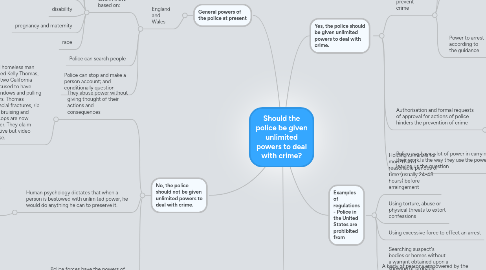
1. No, the police should not be given unlimited powers to deal with crime.
1.1. They abuse power without giving thought of their actions and consequences
1.1.1. Eg. May 8, a 37-year-old homeless man with schizophrenia, named Kelly Thomas, was beated to death by two California cops. The victim was accused to have been peering into car windows and pulling on handles of parked cars. Thomas suffered brain injuries, facial fractures, rib fractures, and extensive bruising and abrasions, and the two cops are now facing charges for murder. They claim Thomas was uncooperative but video evidence prove otherwise.
1.1.1.1. This evidence only proves the abuse of power that police officers exert on helpless victims without reason or compassion.
1.2. Human psychology dictates that when a person is bestowed with unlimited power, he would do anything he can to preserve it.
1.2.1. "Power corrupts. Absolute power corrupts absolutely" - John Emerich Edward Dalberg Acton, first Baron Acton (1834–1902)
1.2.1.1. Case in point, the Stanford Prison Experiment by Philip Zimbargo in 1971 showed that normal, upstanding, moral college students, when elevated to a postition of absolute power over their peers, would turn abusive to assert and maintain their power. Philip Zimbargo, the creator of the experiment, was himself caught in the madness, taking great pains to preserve his power as "Prison Warden".
1.2.1.1.1. In such a case, the police might be more interested in maintaining their state of unlimited power, rather than using their power to enforce the law, resulting in drastic consequences, such as corruption and the pursuit of self interest.
1.3. Police forces have the powers of arrest, search and seizure, and use of force. These powers elevate them above the standards of common man, as the police are expected to be the arm of the law, delivering justice and order within society.
1.3.1. However, these powers, while pivotal in their line of profession, must be moderated, as excessive use of these powers would be detrimental to justice and ultimately, be counterproductive.
1.3.1.1. In giving the police unlimited powers, we would be elevating them to become, judge, jury and adjudicator. As individuals, we are undoubtedly fallible. For this very reason, a justice system exists in countless countries. By giving police unlimited power, and effectively being able to bypass the justice system, we are in effect, subjugating justice.
2. General powers of the police at present
2.1. England and Wales
2.1.1. Police are not allowed to discriminate based on:
2.1.1.1. sex
2.1.1.2. sexual orientation.
2.1.1.3. religion or belief
2.1.1.4. gender reassignment
2.1.1.5. disability
2.1.1.6. pregnancy and maternity
2.1.1.7. race
2.1.2. Police can search people
2.1.3. Police can stop and make a person account; and conditionally question
3. Examples of regulations - Police in the United States are prohibited from
3.1. Holding criminals for more than a reasonable periods of time (usually 24-48 hours) before arraingement
3.2. Using torture, abuse or physical threats to extort confessions
3.3. Using excessive force to effect an arrest
3.4. Searching suspect's bodies or homes without a warrant obtained upon a showing of probable cause
4. Keywords
4.1. Police
4.1.1. A body of persons empowered by the state to enforce the law and limit civil disorder. They are given legitimate use of force.
4.2. Unlimited powers
4.2.1. The right to take any kind of actions before the judgment of law
4.3. Deal with
4.3.1. Cope with, address
4.4. Crime
4.4.1. Breach of rules or laws for which an authoritative body metes out punishment
5. Yes, the police should be given unlimited powers to deal with crime.
5.1. Police need to have a certain level of power to prevent crime
5.1.1. Power to investigate
5.1.1.1. In this regard the police are given power to investigate an individual in order to collect all the evidence that is required to arraign that particular person in court.
5.1.2. Power to contain
5.1.2.1. This is in order to avoid and individual from committing more crimes or to curtail their freedom of movement before they are arraigned in court.
5.1.3. Power to arrest according to the guidance
5.1.3.1. While arresting individuals, the police are given the mandate to use force in order to arrest those who resist. But in doing so, they are not supposed to use excessive force that can cause body harm. However, this force should be used with a lot of professionalism in order to ensure that it is used on the right individuals and only those who resist arrest.
5.1.3.1.1. The power of the police over arresting others rests only in condition when that particular individual has been caught committing a crime or when that particular individual is suspected of having committed a crime.
5.2. Authorisation and formal requests of approval for actions of police hinders the prevention of crime
5.2.1. Forensics teams are not allowed to be dispatched until physical evidence is found, although there may be no other logical explanation
5.2.2. Paperwork and approvals wastes a lot of time, giving the criminal a lot of time to escape
